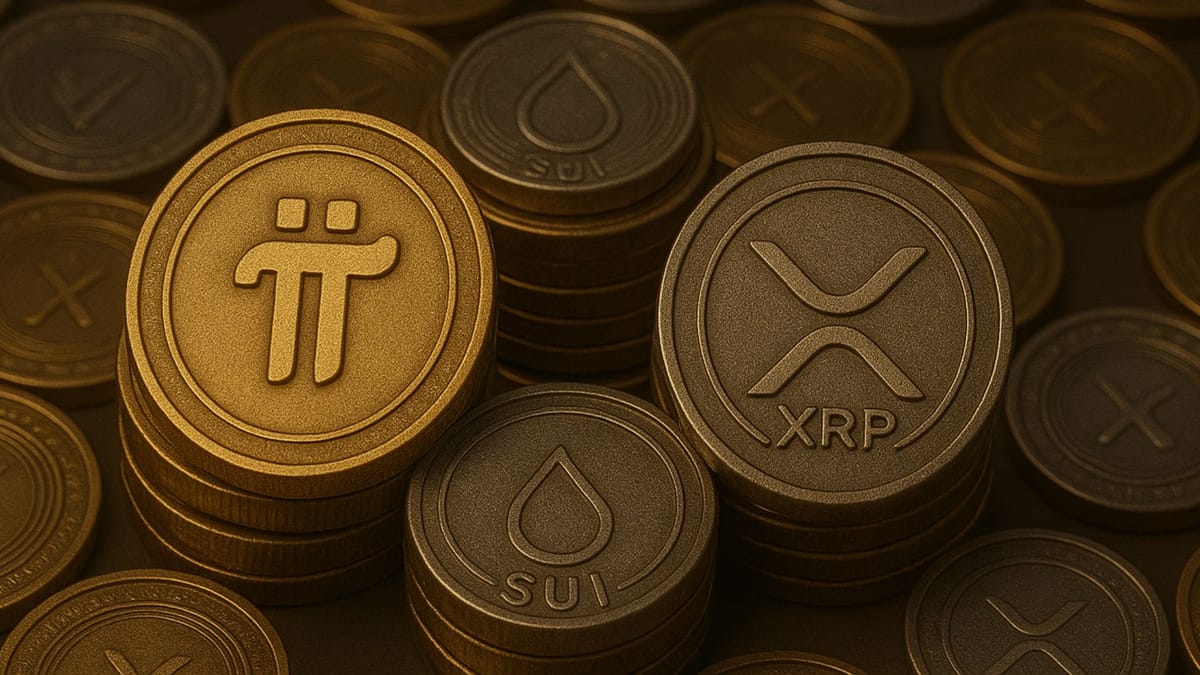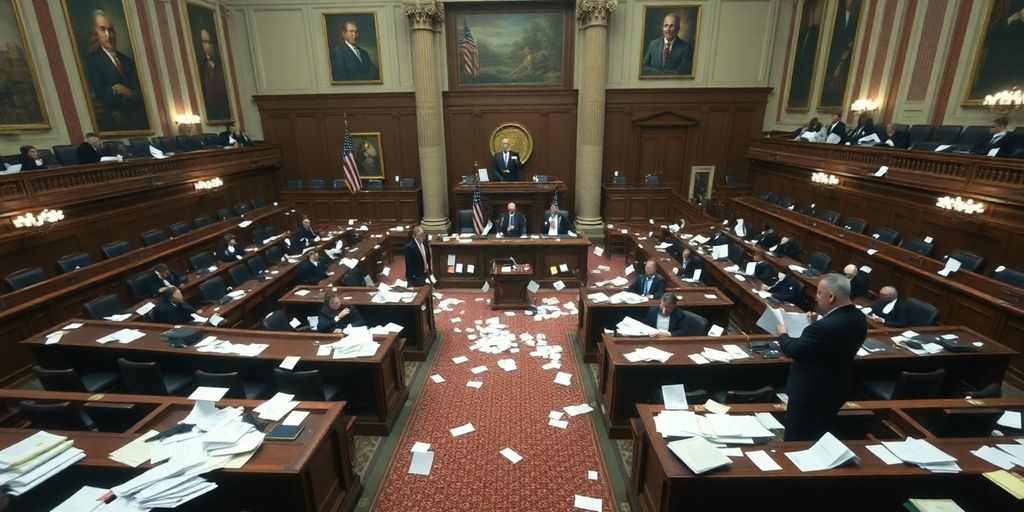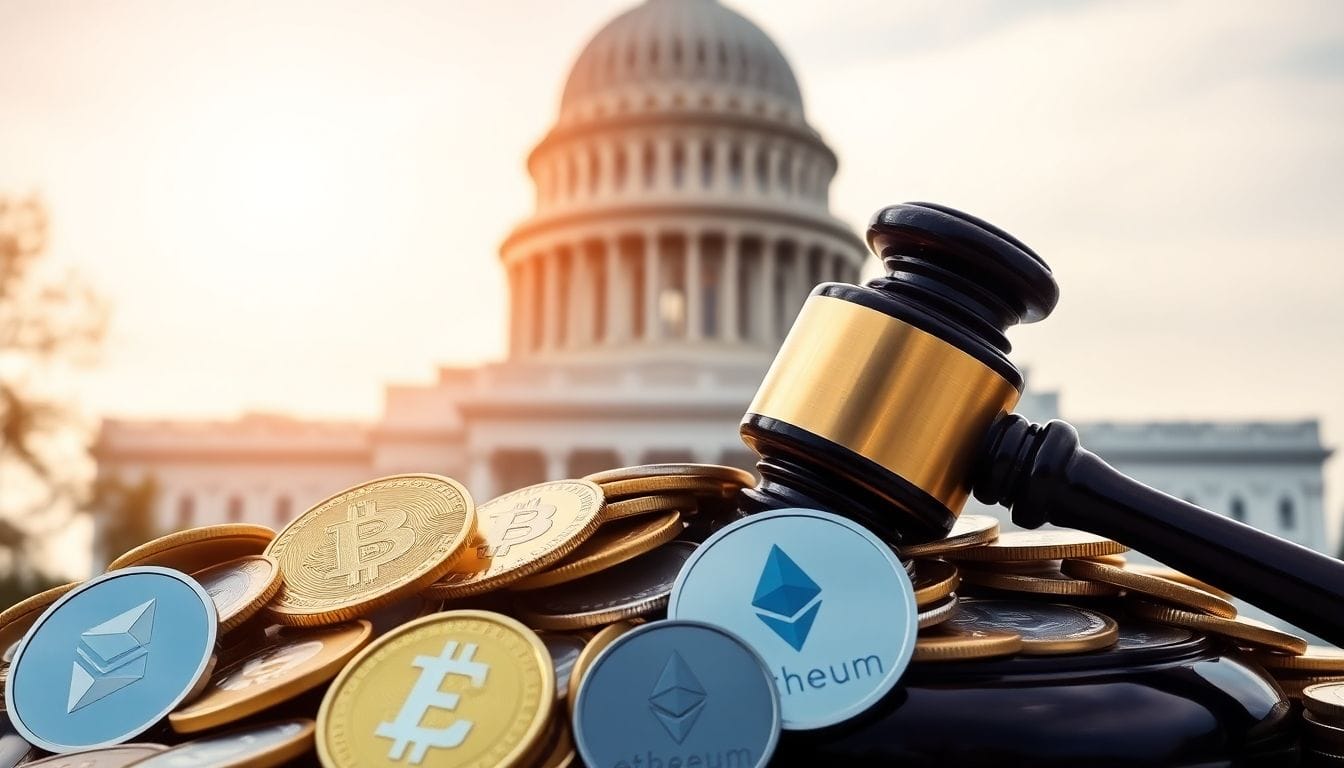House Announces Week of July 14th as “Crypto Week”
Get ready, because the U.S. House of Representatives is setting aside the week of July 14th for something big: 'Crypto Week.' It sounds like a pretty significant moment for digital assets in the country. Lawmakers are planning to tackle some important bills that could really shape how cryptocurrencies and other digital stuff are handled by the government. It's been a long time coming, with a lot of talk and work behind the scenes, and now it looks like things are finally moving forward. This whole event is meant to get the U.S. in a leading position for digital asset technology, and there's a lot of attention on what happens next.
Key Takeaways
- The House of Representatives has officially designated the week of July 14th as "Crypto Week," focusing on digital asset legislation.
- Several key bills are on the agenda, including the FIT21 Act to clarify regulatory roles, the Clarity for Payment Stablecoins Act for stablecoin rules, and the CBDC Anti-Surveillance State Act concerning digital currencies.
- A major focus will be on establishing a federal framework for stablecoins, aiming to boost innovation while protecting consumers and setting operational standards.
- The legislation also addresses concerns about Central Bank Digital Currencies (CBDCs), particularly prohibiting direct retail issuance and aiming to protect financial privacy.
- The overall goal of Crypto Week is to modernize digital asset laws, clarify agency responsibilities, and position the U.S. as a leader in financial technology.
House Announces "Crypto Week" To Advance Digital Asset Legislation
The U.S. House of Representatives has set aside the week of July 14th, 2025, to focus on digital asset legislation. This period, dubbed "Crypto Week," is intended to move forward several key bills that aim to clarify the federal government's approach to regulating digital assets. The initiative is a joint effort by Representative French Hill, who leads the House Financial Services Subcommittee on Digital Assets, and Representative Glenn “GT” Thompson, Chairman of the House Agriculture Committee. They plan to advance legislation that has already gathered support from both parties over the last year.
Week of July 14th Designated for Digital Asset Policy Discussions
This designated week represents a significant push by the House to update the legal framework for digital assets. It's an effort to bring more order to a sector that has seen substantial growth but currently operates under a somewhat scattered regulatory system. Multiple federal and state agencies have a hand in overseeing different aspects, which can create confusion. The goal is to create a more unified and understandable set of rules.
Key Legislation to Clarify Regulatory Frameworks
Several important bills are slated for consideration during "Crypto Week." These include:
- The Financial Innovation and Technology for the 21st Century Act (FIT21): This bill, which previously passed the House in May 2024, seeks to define the roles of the Securities and Exchange Commission (SEC) and the Commodity Futures Trading Commission (CFTC) in regulating digital assets. It aims to provide clearer guidelines and encourage innovation while also protecting consumers.
- The Clarity for Payment Stablecoins Act: This legislation focuses on establishing a federal system for regulating payment stablecoins, which are digital tokens tied to fiat currencies like the U.S. dollar. It will set standards for how these stablecoins are managed, including their reserves and operational safety.
- The CBDC Anti-Surveillance State Act: This bill addresses concerns about central bank digital currencies (CBDCs) by aiming to prevent the Federal Reserve from issuing a CBDC directly to individuals. The intention is to protect financial privacy and limit potential government intrusion into personal transactions.
The legislative agenda for "Crypto Week" highlights a concerted effort to modernize the U.S. approach to digital assets, aiming for a balance between innovation, consumer protection, and market stability. This coordinated legislative action is seen as a step towards establishing clear rules for a rapidly evolving financial sector.
Bipartisan Support for Digital Asset Advancement
There appears to be a good deal of agreement across party lines regarding the need for clearer rules in the digital asset space. Proponents believe that a well-defined legislative structure will give businesses the certainty they need to grow, while also safeguarding investors and the overall health of U.S. capital markets. This bipartisan backing is seen as important for making progress on these complex issues. The House leadership views this week as a chance to solidify America's position as a leader in financial technology, much like how gold stocks are performing well, with Bitcoin sometimes called "digital gold".
Lawmakers have expressed optimism that these bills will help the U.S. stay competitive in the global digital asset market. The focus is on creating a regulatory environment that supports innovation without compromising safety and security. This legislative push is also seen as aligning with broader administration goals for digital asset policy.
Key Bills To Be Considered During Crypto Week
This week, the House of Representatives is focusing on several important pieces of legislation designed to bring more structure to the digital asset space. These bills aim to clarify rules for cryptocurrencies and stablecoins, which is something many in the industry have been asking for. It's a big step towards making sure the U.S. stays competitive in financial technology.
Financial Innovation and Technology for the 21st Century Act (FIT21)
The FIT21 Act is a major piece of legislation that seeks to create a clear regulatory framework for digital assets. It aims to define which agency, the Securities and Exchange Commission (SEC) or the Commodity Futures Trading Commission (CFTC), has oversight over different parts of the digital asset market. This distinction is important for businesses operating in this sector. The bill also looks to promote innovation while making sure consumers and investors are protected. It passed the House previously and is a key focus for this week's discussions. The CFTC would be the main regulator for digital commodities under this proposal.
Clarity for Payment Stablecoins Act
This act focuses specifically on stablecoins, which are digital currencies pegged to the value of traditional assets like the U.S. dollar. The goal is to establish federal standards for these types of digital assets. This includes rules for companies issuing stablecoins, such as requirements for holding adequate reserves and being transparent about their operations. The bill also works to create a regulatory system that works alongside existing state frameworks. Having clear rules for stablecoins is seen as a way to encourage their responsible use and development.
CBDC Anti-Surveillance State Act
Another significant bill on the agenda is the CBDC Anti-Surveillance State Act. This legislation is designed to prevent the Federal Reserve from issuing a central bank digital currency (CBDC) directly to individuals. Supporters of this bill argue that it is necessary to protect financial privacy and prevent potential government overreach in personal financial transactions. The aim is to block the creation of a digital dollar that could be used for surveillance.
These legislative efforts represent a coordinated push to modernize financial laws for the digital age. The House is looking to build on previous work and assert leadership in digital asset policy.
Focus on Stablecoin Regulation and Market Structure

This upcoming "Crypto Week" puts a spotlight on stablecoins, which are digital currencies designed to keep a steady value, usually by being tied to something like the US dollar. It's a big deal because getting the rules right for these could really change how we pay for things.
Establishing Federal Framework for Payment Stablecoins
One of the main goals is to create clear rules for payment stablecoins. Think of it like setting up the lanes on a highway so traffic can flow smoothly and safely. The idea is to have a national system that works alongside existing state regulations. This aims to provide certainty for businesses wanting to issue stablecoins and for people using them. The Clarity for Payment Stablecoins Act is a key piece of legislation aiming to do just that. It's about making sure these digital dollars are backed properly and that the companies issuing them are responsible.
Ensuring Consumer Protection and Operational Standards
When we talk about stablecoins, consumer protection is a big part of the conversation. People need to trust that their digital money is safe. This means setting standards for how these stablecoins are managed, including what assets back them up. We're looking at requirements for things like:
- Reserve Requirements: Making sure there's enough real money or highly liquid assets to match the stablecoins in circulation.
- Operational Security: Rules to prevent hacks and ensure the systems running the stablecoins are robust.
- Transparency: Clear information about how the stablecoins work and who is backing them.
It's about building confidence in the system, much like how people trust traditional banks. The Federal Reserve has been adjusting its approach to digital assets, integrating supervision back into regular processes.
Promoting Innovation in Digital Asset Markets
While regulation is important, the goal isn't to stifle new ideas. Lawmakers want to create an environment where innovation can happen safely. The hope is that clear rules will encourage more companies to develop new products and services using digital assets. This could lead to more efficient payment systems and new ways to manage money. However, some in the traditional finance world still question the need for blockchain integration, as existing fintech solutions already offer improvements. The push for clear regulations aims to bridge this gap and show the potential benefits. It's a balancing act, trying to encourage new tech while keeping things stable and secure, especially as some companies look at issuing their own stablecoins.
Addressing Central Bank Digital Currencies

Prohibiting Direct Retail Issuance of CBDCs
One of the key pieces of legislation being discussed this week is the CBDC Anti-Surveillance State Act. This bill aims to put a stop to the Federal Reserve issuing a central bank digital currency directly to individuals. The idea behind this is to protect people's financial privacy and keep the government from having too much control over personal transactions. It’s a pretty big deal because it sets a boundary on how a digital dollar could be used in the future. Supporters believe this is important for maintaining financial freedom.
Safeguarding Financial Privacy
This focus on privacy is a recurring theme. The proposed legislation wants to make sure that if any form of digital currency is developed, it doesn't become a tool for constant government monitoring. Think about it: a direct digital currency could potentially track every single purchase. The bill wants to prevent that kind of oversight, keeping personal financial data more secure. It’s about making sure that technological advancements don't come at the cost of individual privacy rights. This is something many people are talking about, and it’s good to see it being addressed in Congress.
Limiting Government Overreach in Transactions
Ultimately, the goal here is to limit how much the government can get involved in our day-to-day spending. The CBDC Anti-Surveillance State Act is designed to prevent a scenario where the government has a direct line of sight into every transaction made by citizens. This is seen by some as a way to prevent potential overreach and maintain a level of financial autonomy. It’s a complex issue, balancing innovation with the protection of individual liberties. Many are watching to see how this debate unfolds, especially with other countries exploring similar digital currency options, like El Salvador's Bitcoin bank.
Legislative Goals for Crypto Week

This upcoming week, designated as “Crypto Week,” is focused on advancing several key pieces of legislation. The primary aim is to create a more defined regulatory environment for digital assets in the United States. The House plans to consider bills that aim to clarify agency responsibilities and modernize the existing legal structures. This effort seeks to provide certainty for businesses operating in the digital asset space while also protecting consumers and investors.
Establishing Clear Regulatory Authority Between Agencies
A significant goal is to sort out which government bodies have oversight over different aspects of the digital asset market. Currently, there's overlap and sometimes confusion between agencies like the Securities and Exchange Commission (SEC) and the Commodity Futures Trading Commission (CFTC). Bills like the FIT21 Act are designed to draw clearer lines, specifying which agency handles what. This should help prevent regulatory gaps and make compliance more straightforward for companies.
Modernizing Legal Architecture for Digital Assets
Lawmakers want to update the rulebook to match the realities of modern financial technology. The existing financial laws weren't written with digital assets in mind, leading to uncertainty. By passing legislation, Congress hopes to build a legal foundation that supports innovation while managing risks. This includes creating specific rules for things like stablecoins, which are digital tokens pegged to traditional currencies. The goal is to make sure the U.S. can keep up with technological advancements in finance.
Asserting US Leadership in Digital Asset Policy
There's a clear objective to position the United States as a global leader in digital asset policy. By establishing clear rules and fostering innovation domestically, the hope is to attract businesses and talent, preventing them from moving to jurisdictions with more favorable or clearer regulations. This legislative push is seen as a way to ensure American competitiveness in the evolving digital economy. It's about creating an environment where the U.S. can set the standards for this new financial frontier, rather than playing catch-up. The market has seen significant venture capital funding recently, with over $5 billion invested in July 2025, showing the sector's growth potential.
The legislative agenda for "Crypto Week" aims to bring much-needed clarity to a rapidly evolving sector. By addressing regulatory authority and modernizing financial laws, Congress seeks to balance innovation with investor protection and solidify the U.S.'s position in the global digital asset landscape.
Key legislative actions during this week are expected to include:
- Clarifying the roles of the SEC and CFTC.
- Establishing federal guidelines for payment stablecoins.
- Prohibiting certain aspects of Central Bank Digital Currencies (CBDCs) to protect financial privacy.
This focus on regulatory clarity comes at a time when major financial institutions are increasing their involvement in the crypto space, with significant investments being made in assets like Ethereum.
Industry and Political Reactions to Crypto Week

Support for Regulatory Clarity from Stakeholders
The upcoming "Crypto Week" in the House has generated a good deal of discussion among industry players and political figures alike. Many stakeholders are expressing a positive outlook, seeing this concentrated legislative effort as a necessary step toward providing much-needed clarity in the digital asset space. The push to establish clear rules is widely viewed as a positive development for innovation and market growth. For years, the lack of a defined regulatory structure has been a point of concern, and this week's focus suggests a potential shift. It's hoped that these discussions will lead to a more predictable environment, allowing businesses to operate with greater confidence. This move aligns with efforts to make America a leader in digital financial technology, a goal that has seen support from various political circles.
Alignment with Administration's Digital Asset Agenda
There's a noticeable alignment between the legislative agenda for "Crypto Week" and the current administration's stated interest in digital assets. The focus on bills like the FIT21 Act and the Clarity for Payment Stablecoins Act seems to echo the administration's desire to foster innovation while also addressing potential risks. This coordinated approach suggests a shared vision for how the U.S. should engage with the evolving digital economy. The administration has previously signaled its interest in these areas, and this legislative push appears to be a direct response to that. It's a sign that policymakers are actively working to shape the future of digital finance in the country. The House looks forward to considering these proposals as part of Congress’s efforts to make America the crypto capital of the world.
Anticipation of Landmark Legislation
The upcoming legislative sessions are being watched closely, with many anticipating that the bills considered during "Crypto Week" could represent landmark changes for the digital asset industry. The potential for new frameworks governing stablecoins and clarifying agency roles is significant. This period could set new standards for how digital assets are regulated in the United States. The discussions are expected to cover a range of topics, from market structure to consumer protection, aiming to modernize the existing legal architecture. The outcome of these debates could have a lasting impact on the digital asset landscape, potentially influencing how businesses operate and how consumers interact with these technologies. The focus on stablecoin regulation, for instance, aims to establish a federal framework for payment stablecoins, providing rules for their issuance and oversight.
The legislative focus this week is on creating a more defined path forward for digital assets in the U.S. By addressing key areas like stablecoin regulation and the roles of different government agencies, lawmakers aim to build a more robust and predictable market. This proactive approach is seen by many as a positive step towards solidifying the nation's position in the global digital economy.
Here's a look at some of the key legislative proposals:
- Financial Innovation and Technology for the 21st Century Act (FIT21): Aims to create a federal regulatory framework for digital assets, clarifying jurisdiction between the SEC and CFTC.
- Clarity for Payment Stablecoins Act: Focuses on establishing federal and state regulations for payment stablecoins, including reserve asset standards and operational oversight.
- CBDC Anti-Surveillance State Act: Seeks to prevent the issuance of a retail central bank digital currency (CBDC) to protect financial privacy.
These bills represent a significant effort to update the legal landscape for digital assets, and their consideration this week is a major event for the industry. The potential for a short squeeze in Bitcoin and Ether, alongside broader market movements, adds another layer of interest to the ongoing discussions.
This week, many important people and groups reacted to what's happening with crypto. Some leaders in government and business shared their thoughts on the new digital money and how it's changing things. These reactions show that crypto is becoming a bigger deal in the world. Want to learn more about how these reactions might affect crypto prices? Visit our website to get the latest updates and insights.
Looking Ahead After Crypto Week
So, the House is calling the week of July 14th 'Crypto Week.' They're planning to look at a few bills that could really change how digital money and crypto are handled in the US. Things like the FIT21 Act, which tries to sort out who regulates what between different agencies, and bills about stablecoins and central bank digital currencies are on the table. It feels like a big push to get some clear rules in place, which a lot of people in the industry have been asking for. We’ll have to wait and see what comes out of it all, but it’s definitely a sign that digital assets are getting more attention in Washington.
Frequently Asked Questions
What is "Crypto Week"?
Crypto Week is a special week in July when the U.S. House of Representatives plans to discuss and possibly vote on important new laws about digital money like Bitcoin and stablecoins. It's a big effort to make clear rules for this new type of finance.
What are the main goals of Crypto Week?
The main goals are to create clearer rules for digital assets, decide which government groups are in charge of what, and make sure the U.S. stays a leader in new financial technology. They also want to protect people who use these digital currencies.
What is the FIT21 Act?
The FIT21 Act, or the Financial Innovation and Technology for the 21st Century Act, is a proposed law. It aims to set up federal rules for digital assets and clarify which government agencies, like the SEC and CFTC, have authority over them. It's meant to help innovation while keeping users safe.
What are stablecoins and why are they important for Crypto Week?
Stablecoins are digital coins that try to keep a steady value, often by being linked to real money like the U.S. dollar. A key bill, the Clarity for Payment Stablecoins Act, will be discussed to create national rules for these stablecoins, making sure they are safe and reliable for payments.
What is a CBDC and why is it being discussed?
CBDC stands for Central Bank Digital Currency, which would be a digital version of a country's money issued by its central bank. One of the bills, the CBDC Anti-Surveillance State Act, aims to stop the U.S. from creating a CBDC that people could use directly, mainly to protect people's financial privacy and limit government tracking.
Who supports these new laws?
Many lawmakers, including leaders in the House, support these bills. People in the digital asset industry also generally welcome the idea of clearer rules. Some politicians believe these laws will help America lead in new financial technology and protect consumers.
More Crypto News:
























